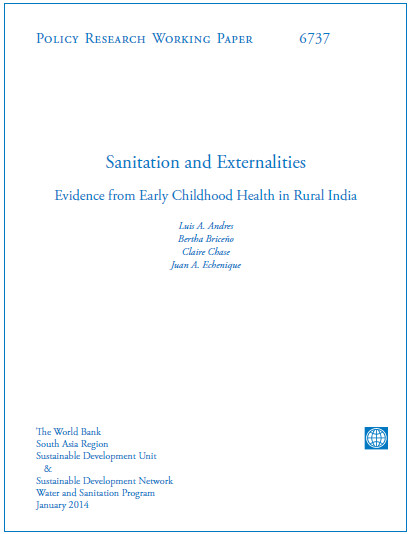Sanitation and externalities: evidence from early childhood health in rural India
 |
report Jan 2014 ; 39 pages
Ed. World Bank - Washington
Downloadable format: PdF
Downloadable from the publisher
Abstract:
This paper investigates the existence and size of benefits from access to sanitation on child health in rural India. It estimates two sources of benefits: a direct benefit a household receives when moving from open to fixed-point defecation or from unimproved sanitation to improved sanitation, and an external benefit (externality) produced by the neighbourhood's access to sanitation infrastructure. Contents:
The paper is organized as follows: Section 1 introduces the study; Section 2 presents the motivation for trying to understand the source of benefits of sanitation; Section 3 reviews the literature on household sanitation and its relation to children's health and welfare; Section 4 describes a theoretical model to understand the direct and external benefit of sanitation, while the empirical implementation is discussed in Section 5; Section 6 describes the data used for this paper. It then presents the empirical results in Section 7, which are analysed in Section 8 through a series of robustness checks. Finally, Section 9 concludes with a discussion of the implications of these results for sanitation policy.
Keywords: |
child (CI) (DT) (ET) , health (CI) (DT) (ET) , rural (CI) (DT) (ET) , sanitation (CI) (DT) (ET) |
Country: |
Publisher/Broadcaster: |
|
World Bank - Washington - Usa |
If there is a broken link, we will be pleased to receive a message: communication@pseau.org